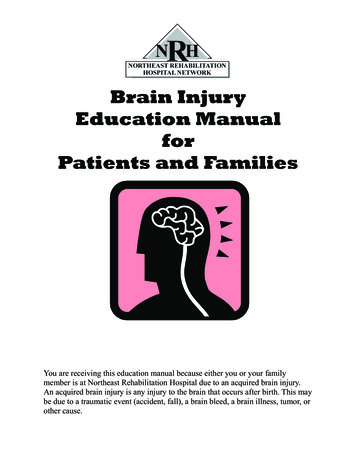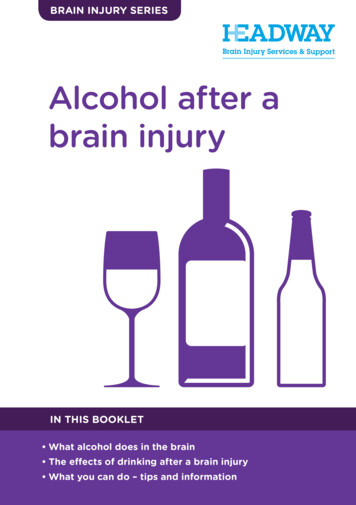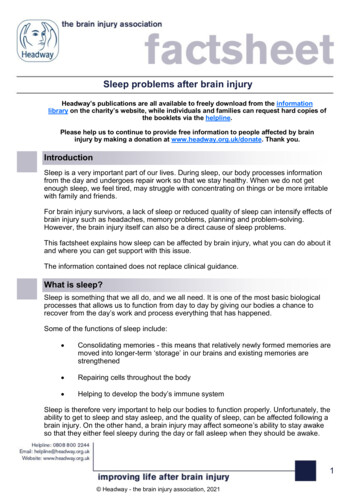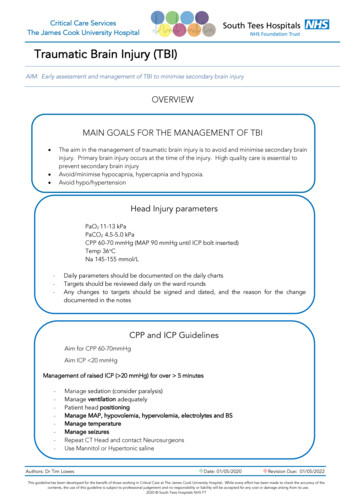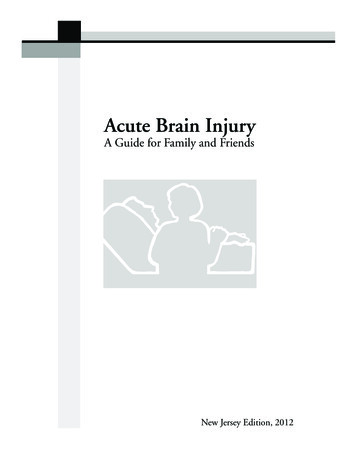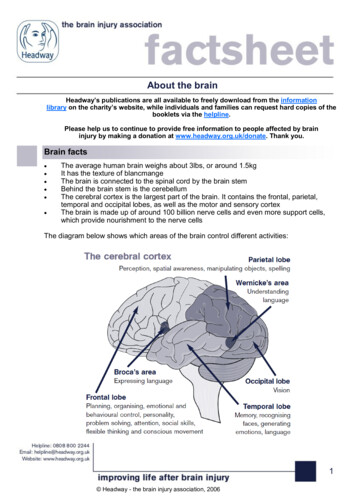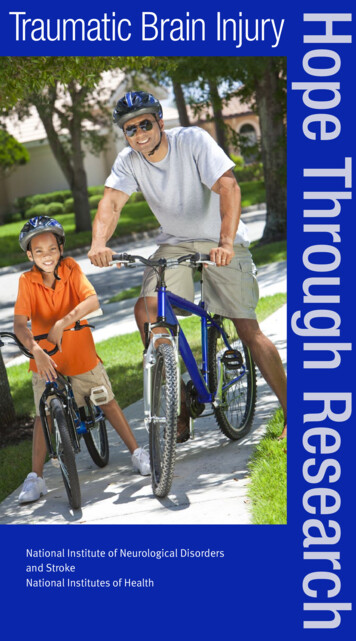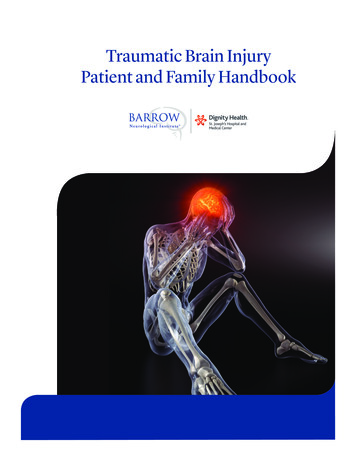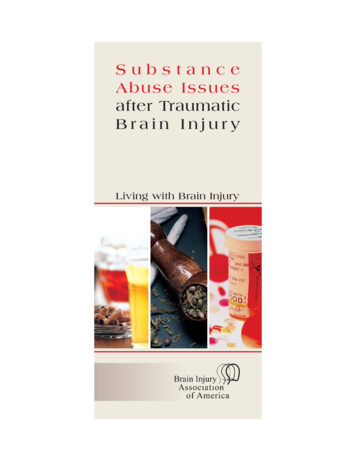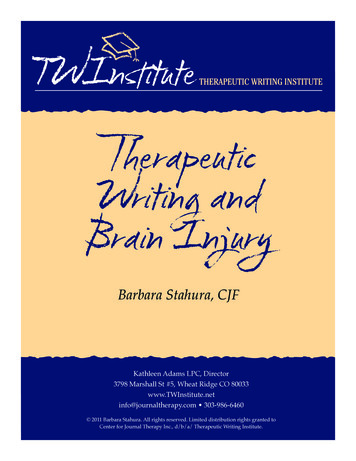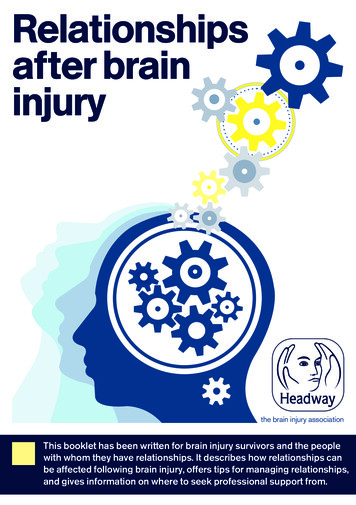
Transcription
Relationshipsafter braininjurythe brain injury associationThis booklet has been written for brain injury survivors and the peoplewith whom they have relationships. It describes how relationships canbe affected following brain injury, offers tips for managing relationships,and gives information on where to seek professional support from.
n Relationships after brain injuryThis e-booklet is an adaptation, created in August 2017, of the Headway print bookletRelationships after brain injury and may contain minor updates to the original version.published byHeadway – the brain injury associationBradbury House, 190 Bagnall RoadOld Basford, Nottingham NG6 8SFAuthors: Tamsin Ahmad, Publications and Research Manager,Headway – the brain injury association and Dr Giles Yeates,Clinical Neuropsychologist and Couples Therapist.acknowledgementsMany thanks to the brain injury survivors who kindly consented tosharing their stories in this booklet.All rights reserved. No part of this publication may be reproduced, stored ina retrieval system, or transmitted by any means, electronic, mechanical,photocopying, recording or otherwise, without prior permission in writingfrom the copyright owner.ISBN: 978-1-873889-82-4 Headway – the brain injury association, 2017.
Headway – the brain injury association nContentsIntroduction. 2What are relationships?. 3How brain injury can affect relationships. 3n Emotional and behavioural effects. 5n Physical effects. 7n Cognitive effects. 9Types of relationships and how they areaffected after brain injury. 12n Couple relationships. 12n Children. 13n Other family members. 14n Friends. 15n Work colleagues. 16Impact of changed relationships. 18Role changes. 19New relationships. 21n Meeting a new partner. 21n Telling a new partner about your brain injury. 22n Relationships and risks. 23Sex and sexuality. 24Tips for managing relationships. 25Professional support. 28Conclusion. 30Useful organisations. 31About Headway. 331n
n Relationships after brain injuryIntroductionRelationships are a very important and intimate part of life.They give us a sense of security and wellbeing, andcontribute towards our sense of self-identity. It is often ourclosest relationships that provide the vital emotional and practicalsupport needed when hardships are faced, such as when a braininjury occurs.For some people, the emotional, behavioural, physical andcognitive changes after brain injury can have an impact onexisting and future relationships. There are a number of ways inwhich this can happen and a number of different outcomes.Some relationships may strengthen, whereas others may becomestrained over time or even completely break down.This booklet has been written to offer information and advice onthis complicated and sensitive topic. It offers information on howrelationships can be affected after brain injury, the impact this canhave, and what can be done to help relationships that arestrained. Useful organisations and sources of support are listedthroughout the booklet, and a list of relevant contact details canbe found at the end.Remember that you can ring the Headway helpline todiscuss any of the issues in this booklet. The helpline canoffer information and emotional support on different aspectsof brain injury. To contact the helpline, call 0808 800 2244 oremail helpline@headway.org.uk.n2
Headway – the brain injury association nWhat are relationships?Arelationship is a connection that people share with oneanother. When we think about the people we haverelationships with, we often consider our immediate and personalrelationships, such as those we have with our family and partners.However, a relationship is a connection that we have with anyonewho is significant in our lives or who we see on a regular basis.We can therefore also have relationships with friends, workcolleagues and neighbours.How brain injury can affectrelationshipsOur brains are specialised in connecting with others throughsocial relationships. There are a number of specific brainstructures that are responsible for processing the emotional andsocial skills that form the basis of all relationships:l The limbic system, insula and cingulate – this is a group ofbrain structures that are collectively responsible for generatingand processing emotions of self and others.l The frontal lobes – this part of the brain is responsible formanaging emotions and behaviour through a number ofcognitive (thinking) skills such as motivation, planning, makingdecisions and inhibiting behaviour, collectively known as theexecutive function. Parts of the frontal lobe are also involved inanticipating other people’s emotions and monitoring one’sown behaviour accordingly.3n
n Relationships after brain injuryl The temporal lobes – parts of the temporal lobes are involvedin thinking about things from another perspective, focusing onthe same thing as others in a group situation, and keepingsocial rules and conventions in mind.l The brainstem – this part of the brain is responsible for reflexemotions, including social reflexes such as smiling, as well asbasic functions such as breathing and sleep/wake cycles.n4
Headway – the brain injury association nWhen the parts of the brain that are responsible for processingemotions and behaviour are injured, the brain injury survivor maystruggle with, or no longer have the skills that are needed to makerelationships work successfully.The injury itself is like a boulder crashing into a lake, and theimpact on all relationships is like the ripple from the splashradiating out to involve many of those in the brain injury survivor’ssocial network. These challenges can cause significant distressfor both the survivor and the people with whom they haverelationships, and may increase as time passes following theinjury.Emotional, behavioural, physical and cognitive effects can allhave an impact on relationships. The following section describesin more detail how common effects of brain injury can affectrelationships.Emotional and behavioural effectsCommon emotional and behavioural effects of brain injury thatcan affect relationships include depression, mood swings,inappropriate emotions, problems with managing anger andlacking empathy.DepressionA brain injury survivor experiencing depression may find it moredifficult to engage in social situations; indeed, they may stopsocialising altogether. Depression can also cause tiredness andlethargy, which may affect the survivor’s interest in socialactivities, especially if fatigue is already an issue. Family, partnersand friends may try to offer support, but this might be resisted,5n
n Relationships after brain injurycausing relationships to become strained. Sexual relationshipscan also be affected, as the survivor may lose their interest in sex.More information on this topic is available in the Headwayfactsheet Depression after brain injury.Mood swingsIt might become difficult for people to maintain positiverelationships with a brain injury survivor whose moods areunpredictable. The brain injury survivor themselves may find itfrustrating when others are unable to understand how they arefeeling, and this may cause further problems in relationships.Inappropriate emotionsEmotions that are inappropriate to the context may be displayedby some survivors, for instance laughing if they are told bad news.This can cause embarrassment in social situations and peoplemay stop socialising with the survivor in order to avoid suchsituations. Partners and family members in particular may struggleif the survivor’s display of inappropriate emotions occurs regularlyand appears insensitive.Managing angerAnger is often directed to those nearest to the survivor, such asfamily members and partners. This can have a serious impact onrelationships, especially if the anger leads to recurring arguments.Families, partners and friends may become anxious abouttriggering the anger, and the survivor may in turn feel negativelyabout their loved ones during periods of anger outbursts.Children may become fearful of a parent who frequently becomesangry, especially if the parent did not have an angry temperamentbefore their injury. More information on this topic is available inthe Headway booklet Managing anger after brain injury.n6
Headway – the brain injury association nLack of insightA brain injury survivor may no longer be able to understand andappropriately respond to how others are feeling, and theirbehaviour may seem distant. For example, the survivor may fail torecognise when a partner is upset and therefore not understandthat they are expected to provide comfort and support. Or theymay not realise that if they have upset a friend, the appropriateresponse would be to apologise. The survivor themselves mayfeel quite confused about what to do in these instances butchoose to keep this confusion to themselves.Physical effectsCommon physical effects of brain injury that can affectrelationships include mobility problems, communicationproblems, sexual dysfunction, hormonal problems, pain, fatigueand facial injuries.Mobility problemsMobility problems, such as dizziness and balance problems, canmake it difficult for people to socialise in crowded environments.The brain injury survivor may find that they are spending less timewith friends than they did prior to their injury, and their socialnetwork may start to dwindle. A child’s relationship with theirbrain injured parent may be affected if the parent is no longerable to engage in physical play with them, such as through sport.Mobility problems might make it more difficult for the brain injurysurvivor to engage in sexual activity with their partner or spouse;sex may therefore turn into an activity that needs to be planned,or even become impossible, taking away the spontaneity andenjoyment.7n
n Relationships after brain injuryCommunication problemsWe use communication to express how we are feeling aboutthings, find out how others are feeling and discuss day-to-daythings that we think are important. Some people developproblems with their speech or word retrieval after brain injury.Depending on the severity of the problem, families, partners andfriends might find it difficult to understand the brain injury survivor,and more effort may be required to have basic conversations.For more information on this topic, see the Headway bookletCoping with communication problems after brain injury.Sexual dysfunctionVarious effects of brain injury can result in sexual dysfunction;this is discussed in more detail in the section Sex and sexuality.Hormonal problemsInjury to the hypothalamus and/or pituitary gland of the brain cancause hormonal problems in some brain injury survivors. This canlead to a range of issues such as depression, sexual difficultiesand mood swings, among other things, that may affectrelationships. More information on this is available in the Headwayfactsheet Hormonal imbalances after brain injury.PainPain can be experienced anywhere in the body following braininjury. It might be experienced occasionally, regularly or all thetime. This can make it difficult for the brain injury survivor toengage in day-to-day activities. They may no longer enjoyactivities or socialising with friends if they are in pain. Sexualactivities may become altogether impossible. Family membersand partners may find it distressing if they are not able to comfortthe survivor with the sensation of touch.n8
Headway – the brain injury association nFatigueBrain injury survivors experiencing fatigue may struggle withcommitting to and attending social get-togethers, which maymake them feel fatigued for hours or days afterwards. Familyactivities may need to be shortened, reorganised or rescheduledto accommodate the survivor’s new routine. It might becomedifficult for the survivor to spend long periods of time with people,especially children who often demand high levels of energy. Formore information on this topic, see the Headway bookletManaging fatigue after brain injury.Facial injuriesIf a brain injury survivor has been in an accident, they may havevisible injuries to the head or face. This could include scarring tothe face, indents to the skull or facial disfigurements. Familymembers and partners may struggle with the change in physicalappearance. Children may not understand why their parent looksdifferent and might be frightened, depending on their age. If thefacial injury is very apparent, it might become more difficult for thebrain injury survivor to find a partner.Cognitive effectsCommon cognitive effects of brain injury that can affectrelationships are memory problems, problems with attention andconcentration, executive dysfunction and lack of insight.Memory problemsMemory problems after brain injury may cause someone to forgetkey dates such as birthdays, or social commitments such asmeeting a friend for lunch. Other people may misinterpret thisforgetfulness as being neglectful. For example, friends who donot see the survivor regularly may not realise how memory9n
n Relationships after brain injuryproblems affect the survivor on a day-to-day basis. Moreinformation on this topic is available in the Headway bookletMemory problems after brain injury.Attention and concentrationIt may be difficult for the brain injury survivor to attend to, orconcentrate on things for sustained periods of time, for instance,following a conversation in which lots of people are involved andthe topic is changing quite rapidly. This may appear to others asthough the survivor is disinterested.Executive dysfunctionExecutive dysfunction can make a brain injury survivor impulsive,unpredictable or unable to make appropriate decisions. This mayaffect their ability to socialise, as decisions about social behaviourare often complex, and many people rely on ‘gut-feeling’ andintuition to assess whether a behaviour is appropriate orinappropriate in a certain social situation. Without these skills, abrain injury survivor may struggle with social problem-solving.These issues are also likely to alter a person’s personality and thismay have an impact on existing or future relationships. Families,partners and friends may feel like the person is no longer whothey once were and question whether they will ever be the sameagain. More information on this topic is available in the Headwayfactsheet Executive dysfunction after brain injury.Lack of insightA brain injury survivor may not be aware of the changes that theirbrain injury has resulted in, including their social behaviour. This isnot a case of denial, but rather the survivor does not recognisethe change or does not attribute it to their injury. This can lead tofrustration and arguments within the family network as the familyn 10
Headway – the brain injury association ntries to explain the nature of the survivor’s problems, while thesurvivor is unable to recognise it. More information on this canbe found in the Headway factsheet Lack of insight after braininjury.11 n
n Relationships after brain injuryTypes of relationships andhow they are affected afterbrain injuryThis section offers information on how brain injury can have animpact on the different types of relationships that manypeople have in their day-to-day lives.Couple relationshipsRelationships between partners are one of the most commonlyaffected types of relationships after brain injury. Both partnersoften feel a strong sense of commitment to the other, especiallyafter a life-changing event has occurred, such as one partnersustaining a brain injury.Couples usually spend a significant amount of time together, andso the brain injury survivor’s partner is often aware of the effectsof the injury, including ‘hidden’ effects. Further, in supportingbrain injury survivors, partners often take on caring roles. This canlead to the boundaries between the roles of ‘carer’ and partnerbecoming blurred.If the survivor’s personality has changed, the partner may feel thatthey are no longer the person they originally chose to be in arelationship with, resulting in feelings of confusion, longing,sadness and loss. The survivor themselves may no longer feel thesame way about the relationship as they did prior to the injury.However, enduring challenging experiences like this can also,with support, strengthen some couple relationships.n 12
Headway – the brain injury association nMore information on this can be found in the Headway factsheetBrain injury: a guide for couples.Case study“Sheema and I had been married for just three months at thetime of the incident. My mood swings put enormous pressureon our marriage. The effects of my brain injury have beenunbelievably tough on Sheema, but she has taken our vow of‘in sickness and in health’ very seriously.”Dave – to read more of Dave’s story, visit the My Storysection of the Headway website.ChildrenThe reaction a child will have to their parent sustaining a braininjury will depend on a number of things such as the child’s age(and their ability to understand the consequences of their parent’sinjury), their temperament, the type of relationship that they hadwith the parent prior to the injury, and the way in which the injuryhas affected the parent.Relationships between some parents and their children maystrengthen. Children can also offer a potential contribution to theirparent’s recovery, if supported in an appropriate manner.However, it can also be quite common for the child to feel distantand confused about the relationship, especially if the parent haschanged.More information on this can be found in the Headway bookletSupporting children when a parent has had a brain injury.13 n
n Relationships after brain injuryCase study“I found it difficult to get through to him and his brain injurymeant that he struggled to engage and connect with Katie. Shesaw her daddy’s anger outbursts, and little things such asWarren not saying goodbye to Katie when he went out weredifficult for a toddler to understand.”Sarah – to read more of Sarah’s story, visit the My Storysection of the Headway website.Other family membersIt is often family members, such as partners, parents and siblings,who spend the most time with the brain injury survivor in the earlystages, for instance when the survivor is in hospital or when theyfirst return home. These are often emotionally intense and difficulttimes for everyone, and experiences such as this can eitherstrengthen or strain family relationships.Family members may take on the role of caring for the survivor.This may lead to feelings of stress as the family member finds theyare less able to spend time with friends or doing activities theyenjoy. On the other hand, some families may enjoy being able tospend more time together than they did prior to the injury.More information is available in the Headway factsheets Braininjury: a guide for siblings and Brain injury: a guide forgrandparents.n 14
Headway – the brain injury association nCase study“My mum hasn’t been the easiest person to deal with at times. Itcan be very challenging trying to adapt to new behaviours in thefriend and mother you have known your entire life. She hasbeen on Headway courses to help ‘manage challengingbehaviour’ after such injuries, which have given us great tips tomove forward and cope with unexpected changes to herpersonality. Many people don’t realise that it’s not just theindividual person who is forced to adapt to life after braininjury.”Lauren – to read more of Lauren’s story, visit the My Storysection of the Headway website.FriendsMany friends, unless they are very close friends or have visited thebrain injury survivor in hospital, will have little understanding of thenature of brain injury and how this has affected the survivor. As aresult, friends may make fewer allowances of the effects that thebrain injury survivor experiences, especially if these are ‘hidden’. Insocial situations, friends may initially joke about the survivor’s braininjury or trivialise the effects of it from a lack of understanding,failing to recognise the impact this has on the survivor themselves.It is unfortunately quite common for brain injury survivors to feel asthough friends are drifting away. However, as with familymembers, some friendships may in fact strengthen, especially if afriend is sympathetic and willing to learn about brain injury.More information is available in the Headway factsheet Braininjury: a guide for friends.15 n
n Relationships after brain injuryCase study“Marie is my good friend and, though I had only known her fornine months when she sustained her brain injury, it doesn’tseem like much to call her regularly to make sure that shealways knows there is someone on hand to help her if sheneeds assistance.”Kathryn – to read more of Kathryn’s story, visit the My Storysection of the Headway website.Work colleaguesThe people with whom we work often form an important socialnetwork in our lives. Some working relationships with colleaguesmay even develop into friendships, whereas others stay asprofessional relationships restricted to the workplace.Colleagues directly involved with the survivor, such as managers,may well have an understanding about the survivor’s injury, as it islikely that they will have been kept informed while the survivor wasin hospital. However, it is unlikely that other colleagues will knowas much detail unless the survivor had requested this informationbe passed on.For brain injury survivors who find they cannot return to work aftertheir injury, relationships with former colleagues may change. Itmay be that colleagues who are also friends continue to visit thesurvivor, but this might taper off over time. The changedcircumstance of not seeing work colleagues on a regular basiscan lead to feelings of social isolation and a loss of a familiarsocial network.n 16
Headway – the brain injury association nThose brain injury survivors who are able to return to work mayhave difficulties with maintaining appropriate social contact withcolleagues. Colleagues may also struggle to understand andadapt to the survivor’s new needs or pace of work, which mayinterfere with their working relationship. Supervisors andmanagers may not know how to respond to such challenges in atimely and productive way, especially if they are not educated inthe effects of brain injury. These difficulties can often lead tolosses of employment, demotion in roles and exclusion from workopportunities.More information is available in the Headway factsheet Braininjury: a guide for colleagues.Case study“My colleagues felt helpless as they watched the person whohad once been the most competent in the team struggle toanswer their questions. Even today, communication continuesto be one of my key challenges after brain injury.”Kerry – to read more of Kerry’s story, visit the My Storysection of the Headway website.17 n
n Relationships after brain injuryImpact of changed relationshipsThe relationships described in the previous section are allaffected by a brain injury to different degrees and in differentways. However, when any type of relationship is changed, thiscan commonly cause feelings of sadness, confusion, hurt andloneliness among everyone involved. In turn, the brain injurysurvivor may become withdrawn and socially isolated, and itmight become more difficult for them to seek support. This mightbe more of an issue in some types of relationship than others; forinstance, drifting away from a partner can be more distressingthan drifting away from work colleagues. However, this will, ofcourse, depend on the individual and their own relationships.Some brain injury survivors may feel that their loved ones do notunderstand how they are feeling, which can cause them tobecome frustrated and distant. Conversely, families and friends ofa brain injury survivor may also feel frustrated and helpless if theyare unable to understand how the survivor is feeling and how theycan help.Both brain injury survivors and their partners, relatives and friendscan be affected by a change in the relationship, and it’s importantthat both feel able to access support accordingly. Moreinformation on this is available in the section Professionalsupport.n 18
Headway – the brain injury association nRole changesWhen a brain injury survivor starts to adapt to life after theirinjury, they may find that they are no longer able to dothings they once did prior to the injury. This can include working,driving, taking on household responsibilities or managingfinances. It may be that someone else close to the survivor hasto take such tasks on instead, such as a partner doing theweekly grocery shopping or a parent managing their finances.The partner or relative may also have to provide care andsupport to the survivor. Taking on a caring role can be tiring anddifficult, especially if the partner or relative is required toundertake tasks that are unfamiliar to them, with minimal or noexternal support. A long period of physical care for the survivorcan make it particularly difficult for many partners to later returnto a sexual relationship.Brain injury survivors themselves may experience a change inself-worth due to the change in their role. It can be very difficultto come to terms with the fact that they need support with, orare no longer able to do the things that were once normal forthem. They may also feel guilty that their partner or relative isrequired to take on new tasks that they previously didthemselves.The low self-esteem felt by the brain injury survivor and theincreased stress experienced by partners or relatives canaltogether lead to increased tension, affecting the relationship.Feelings of frustration can also be common if the survivor’sindependence is affected, for instance if they are unable todrive.19 n
n Relationships after brain injuryIn such instances, it is important for both the brain injury survivorand their partner or relative to be able to openly communicatewith one another and talk through any tensions or issues thatarise. External support may also be helpful to adapt to rolechanges. For more suggestions, see the section Tips formanaging relationships.n 20
Headway – the brain injury association nNew relationshipsAlthough we are all born with a number of relationships in ourlives, such as those we have with family members, wecontinue to develop new relationships across our lifetime, such asthose we have with a partner. For some brain injury survivors, theprospect of meeting a future partner can be daunting. They mayworry about how their injury will affect their chances of ‘meetingsomeone’, especially if they experience depression or lowself-esteem. Survivors may also question whether they areobliged to tell new people in their life about their brain injury, orwhether they should keep this information to themselves.Despite these challenges, many people do go on to develop newrelationships after brain injury. Taking your time with getting toknow someone, going on a few initial dates, taking things at yourown pace and seeking advice from close friends and family canhelp with forming new relationships.Greater professional support may also be required in order to usethe same community resources as non-injured people to meetothers, form romantic relationships, and find ways of meetingsexual needs. More information on this is available in the sectionProfessional support.Meeting a new partnerMany people find that socialising can increase opportunities ofmeeting new people, and in doing so meeting a new partner. Youcould therefore look into joining local groups or clubs based onyour interests to meet new people who share similar interests toyou. If you don’t feel comfortable with meeting new people orbeing in a group, consider arranging smaller get-togethers whereclose friends can invite one or two of their friends along.21 n
n Relationships after brain injuryAnother option could be to explore dating services in your localarea. Dating services are very popular and used by many people,regardless of whether they have a disability or not.Some people also find that online dating platforms are a goodway to meet a potential partner, although there can be risksinvolved in ‘meeting’ people online and it may also be difficult tofind someone with an understanding of brain injury. Professionalsupport should be sought if appropriate to assist with thisprocess and the risks of using such online services should beresearched beforehand
Common emotional and behavioural effects of brain injury that can affect relationships include depression, mood swings, inappropriate emotions, problems with managing anger and lacking empathy. Depression A brain injury survivor experiencing depression may find it more difficult to engage in social situations; indeed, they may stop
